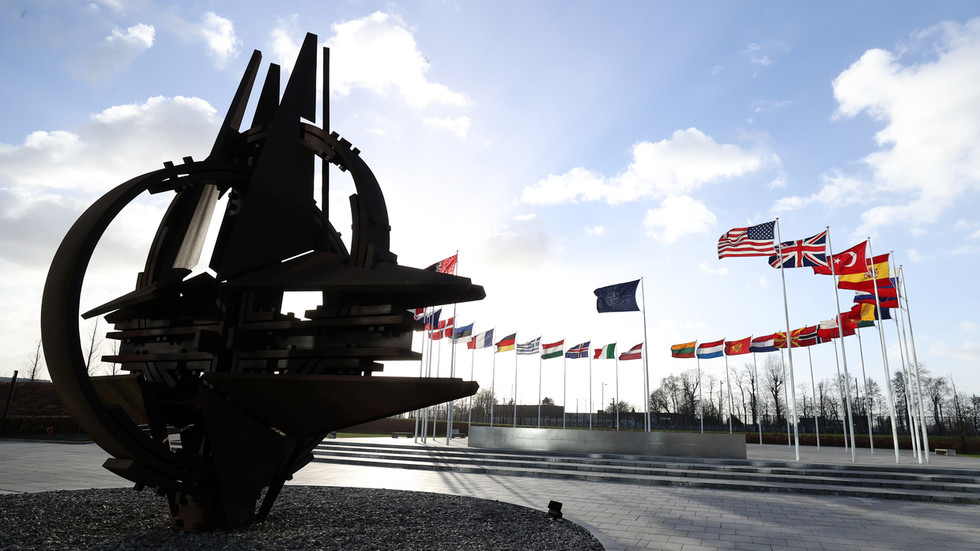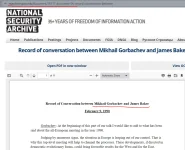German magazine
Der Spiegel on Friday < ---source
Newly discovered document proves existence of pledge not to expand NATO eastward towards Russia, proving Moscow right

www.rt.com
The minutes of a March 6, 1991 meeting in Bonn between political directors of the foreign ministries of the US, UK, France, and Germany contain multiple references to
“2+4” talks on German unification in which the Western officials made it
“clear” to the Soviet Union that NATO would not push into territory east of Germany.
“We made it clear to the Soviet Union – in the 2+4 talks, as well as in other negotiations – that we do not intend to benefit from the withdrawal of Soviet troops from Eastern Europe,” the document quotes
US Assistant Secretary of State for Europe and Canada Raymond Seitz.
“NATO should not expand to the east, either officially or unofficially,” Seitz added.
A British representative also mentions the existence of a
“general agreement” that membership of NATO for eastern European countries is
“unacceptable.”
“We had made it clear during the 2+4 negotiations that we would not extend NATO beyond the Elbe [sic],” said
West German diplomat Juergen Hrobog.
“We could not therefore offer Poland and others membership in NATO.”
Given that I meet a paywall and don't have access to these "new" minutes, I'm not going to assume that German journalists hype and characterization is warranted.
I will say, however, that the record on this claim is very muddy, complicated by evolving negotiations, and it's ambiguity exists only because the Russians didn't bother to seek either a treaty or memorandum of understanding...in writing.
As you likely know, it started with the 1990 negotiations on Germany. And in the latter half of the 1990s, Russian officials retrospectively became concerned and began to claim they had “categorical assurances,” “solemn pledges,” and “binding commitments” that the former vassal countries (aside from East Germany) would be brought into NATO.
Yet, the Russians declined to release Soviet documents of these events and continued to stonewall till a decade passed in the 2000s. Since then the crucial notes and detailed notes from these negotiations from a RUSSIAN perspective was released. Those include the diaries and notebooks of Teimuraz Stepanov-Mamaladze, the chief aide to Soviet Foreign Minister Eduard Shevardnadze, who took notes on Shevardnadze's discussions and thoughts before, during, and after the 1990 negotiations.
What U.S. officials thought among them themselves is not relevant unless they conveyed it to their Soviet counterparts. While most of this material is in Russian, there are two open sources that are undeniably important: Mikhail Gorbachev's interview in October of 2014, and Shevardnadze's numerous interviews.
Gorbachev unambiguously stated that that NATO expansion “was not discussed at all” and “was not brought up.” and Shevardnadze's has repeatedly insisted that “a possible eastward expansion of NATO” beyond Germany “was never discussed in the inner circles of the Communist Party of the Soviet Union in 1990” and that “the question never came up [in the talks on German reunification. When I was the minister of foreign affairs in the Soviet Union, NATO's expansion beyond German borders never came up for negotiation.”
Gorbachev and Shevardnadze held crucial negotiations in February 1990 with U.S. Secretary of State James Baker and West German Chancellor Helmut Kohl, but when the topic of NATO came up their only concern was about the future status of the territory that had been part of the GDR since 1949. More than 330,000 Soviet troops were still deployed on East German soil, and the Soviet Union as a postwar occupying power enjoyed international legal prerogatives in the GDR. The disposition of East German territory during the process of German reunification was a key sticking point in the negotiations, and Gorbachev and Shevardnadze discussed it at length with their Western counterparts. The United States and the Federal Republic of Germany were able to arrange a special transitional status for GDR territory, as spelled out in the final accords. The notion that Soviet leaders believed that those accords were referring to Poland, Hungary, Czechoslovakia, Romania, or Bulgaria is an anachronistic distortion.
Joshua Shifrinson's article “Deal or No Deal?” presents a flawed account of the negotiations in 1990 that led to the reunification of Germany.1 His observations at the end of the piece about Russian foreign policy under Vladimir Putin overlook the continuity of Russian policy toward neighboring...

direct.mit.edu





